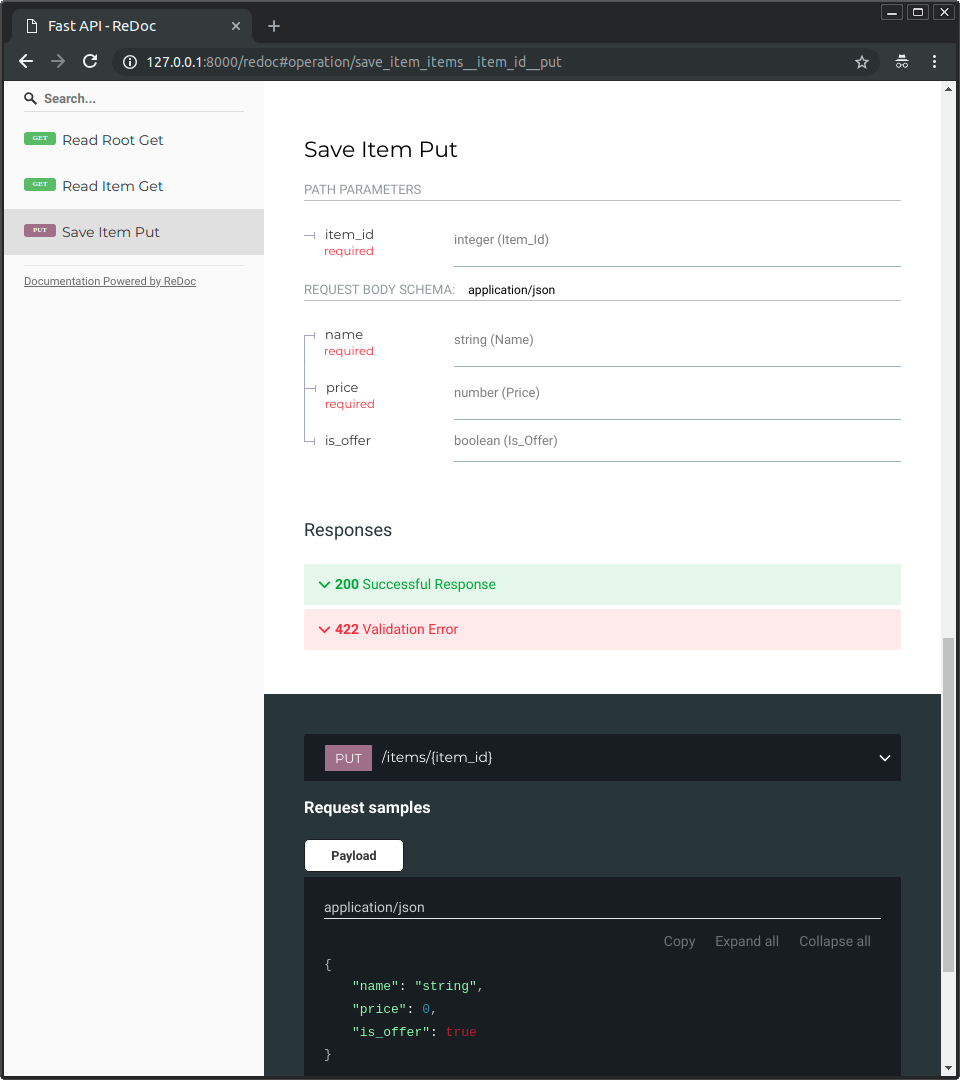- Sort Score
- Num 10 results
- Language All
Results 31 - 40 of 1,613 for _parameters (0.13 seconds)
-
docs/de/docs/tutorial/cookie-params.md
# Cookie-Parameter { #cookie-parameters } Sie können Cookie-Parameter auf die gleiche Weise definieren wie `Query`- und `Path`-Parameter. ## `Cookie` importieren { #import-cookie } Importieren Sie zuerst `Cookie`: {* ../../docs_src/cookie_params/tutorial001_an_py310.py hl[3] *} ## `Cookie`-Parameter deklarieren { #declare-cookie-parameters } Deklarieren Sie dann die Cookie-Parameter mit derselben Struktur wie bei `Path` und `Query`.Created: Sun Dec 28 07:19:09 GMT 2025 - Last Modified: Wed Sep 24 08:10:28 GMT 2025 - 1.8K bytes - Click Count (0) -
docs/de/docs/tutorial/path-params.md
# Pfad-Parameter { #path-parameters } Sie können Pfad-„Parameter“ oder -„Variablen“ mit der gleichen Syntax deklarieren, welche in Python-<abbr title="Formatstring – Formatierter String: Der String enthält Ausdrücke, die mit geschweiften Klammern umschlossen sind. Solche Stellen werden durch den Wert des Ausdrucks ersetzt">Formatstrings</abbr> verwendet wird: {* ../../docs_src/path_params/tutorial001_py39.py hl[6:7] *}Created: Sun Dec 28 07:19:09 GMT 2025 - Last Modified: Wed Dec 17 20:41:43 GMT 2025 - 10.5K bytes - Click Count (0) -
docs/en/docs/index.md
* The alternative documentation will also reflect the new query parameter and body:  ### Recap { #recap } In summary, you declare **once** the types of parameters, body, etc. as function parameters. You do that with standard modern Python types.Created: Sun Dec 28 07:19:09 GMT 2025 - Last Modified: Thu Dec 25 11:01:37 GMT 2025 - 23.5K bytes - Click Count (0) -
docs/de/docs/python-types.md
* Die Variable `items_s` ist ein `set`, und jedes seiner Elemente ist vom Typ `bytes`. #### Dict { #dict } Um ein `dict` zu definieren, übergeben Sie zwei Typ-Parameter, getrennt durch Kommas. Der erste Typ-Parameter ist für die Schlüssel des `dict`. Der zweite Typ-Parameter ist für die Werte des `dict`: {* ../../docs_src/python_types/tutorial008_py39.py hl[1] *} Das bedeutet: * Die Variable `prices` ist ein `dict`:Created: Sun Dec 28 07:19:09 GMT 2025 - Last Modified: Wed Dec 17 20:41:43 GMT 2025 - 17.9K bytes - Click Count (1) -
impl/maven-core/src/test/java/org/apache/maven/plugin/PluginParameterExceptionTest.java
mojoDescriptor.setPluginDescriptor(pluginDescriptor); Parameter parameter = new Parameter(); parameter.setType("java.lang.String[]"); parameter.setName("toAddresses"); parameter.setRequired(true); PluginParameterException exception = new PluginParameterException(mojoDescriptor, Collections.singletonList(parameter)); assertEquals(
Created: Sun Dec 28 03:35:09 GMT 2025 - Last Modified: Fri Mar 21 04:56:21 GMT 2025 - 6.8K bytes - Click Count (0) -
src/main/java/org/codelibs/fess/app/web/cache/CacheForm.java
/** * Form class for cache-related operations. * Contains parameters for document caching and error page display. */ public class CacheForm { /** Document ID for cache operations. */ @Required @Size(max = 100) public String docId; /** Highlight query parameters. */ public String[] hq; /** Search query parameter for error page. */ public String q;Created: Sat Dec 20 09:19:18 GMT 2025 - Last Modified: Thu Jul 17 08:28:31 GMT 2025 - 1.6K bytes - Click Count (0) -
fess-crawler/src/main/java/org/codelibs/fess/crawler/extractor/impl/FilenameExtractor.java
* If this parameter is not present, an empty string is returned as the content.</p> */ public class FilenameExtractor extends AbstractExtractor { /** * Constructs a new FilenameExtractor. */ public FilenameExtractor() { // Default constructor } /** * Extracts the filename from the parameters. *Created: Sat Dec 20 11:21:39 GMT 2025 - Last Modified: Wed Nov 19 08:55:01 GMT 2025 - 2.7K bytes - Click Count (0) -
docs/en/docs/tutorial/header-params.md
# Header Parameters { #header-parameters } You can define Header parameters the same way you define `Query`, `Path` and `Cookie` parameters. ## Import `Header` { #import-header } First import `Header`: {* ../../docs_src/header_params/tutorial001_an_py310.py hl[3] *} ## Declare `Header` parameters { #declare-header-parameters } Then declare the header parameters using the same structure as with `Path`, `Query` and `Cookie`.Created: Sun Dec 28 07:19:09 GMT 2025 - Last Modified: Sun Aug 31 09:15:41 GMT 2025 - 3K bytes - Click Count (0) -
build-logic/documentation/src/main/groovy/gradlebuild/docs/dsl/source/model/MethodMetaData.java
Objects.equals(ownerClass.getClassName(), that.ownerClass.getClassName()) && Objects.equals(parameters, that.parameters) && Objects.equals(returnType, that.returnType); } @Override public int hashCode() { return Objects.hash(super.hashCode(), name, ownerClass, parameters, returnType); } public ClassMetaData getOwnerClass() { return ownerClass; }
Created: Wed Dec 31 11:36:14 GMT 2025 - Last Modified: Wed Dec 09 08:14:05 GMT 2020 - 4.9K bytes - Click Count (0) -
docs/en/docs/tutorial/dependencies/index.md
{* ../../docs_src/dependencies/tutorial001_an_py310.py hl[13,18] *} Although you use `Depends` in the parameters of your function the same way you use `Body`, `Query`, etc, `Depends` works a bit differently. You only give `Depends` a single parameter. This parameter must be something like a function.Created: Sun Dec 28 07:19:09 GMT 2025 - Last Modified: Sun Aug 31 09:15:41 GMT 2025 - 9.6K bytes - Click Count (0)